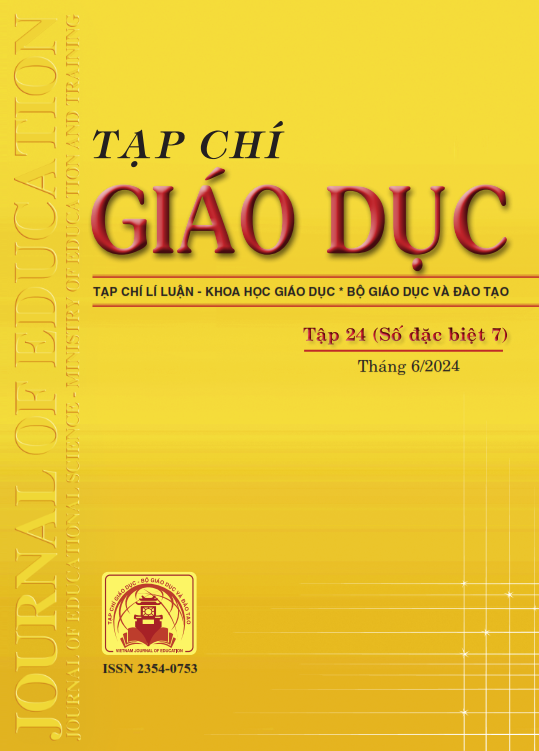Nghiên cứu sự thay đổi năng lực hợp tác giải quyết vấn đề trong thực hiện nhiệm vụ học tập của học sinh trung học cơ sở
Tóm tắt
The competence to collaboratively solve problems is a core competence of 21st century citizens. Developing students' collaborative problem-solving competence is always the goal of education. This study aims to evaluate the change in collaborative problem-solving competence in performing learning tasks of secondary school students. The experiment was conducted for 6 months, with 80 7th grade students divided into two experimental and control groups at a secondary school, Hanoi city. The results showed that the competence to cooperate in solving problems in performing learning tasks of students in the experimental class was statistically significantly improved compared to the control class. The manifestations of the component competences of collaborative problem-solving competence have all been enhanced and improved compared to before the experiment.
Tài liệu tham khảo
Care, E., Griffin, P., & Wilson, M. (2015). Assessment and Teaching of 21st Century Skills. Springer Cham.
Đặng Thị Diệu Hiền (2021). Phát triển năng lực hợp tác giải quyết vấn đề qua tổ chức học tập trải nghiệm cho sinh viên các ngành kĩ thuật. Luận án tiến sĩ Giáo dục học, Trường Đại học Sư phạm Kĩ thuật Thành phố Hồ Chí Minh.
Fawcett, L. M., & Garton, A. F. (2005). The effect of peer collaboration on children’s problem-solving ability. The British Journal of Educational Psychology, 75(Pt 2), 157-169. https://doi.org/10.1348/000709904X23411
Fiore, S. M., Graesser, A., Greiff, S., Griffin, P., Gong, B., Kyllonen, P., Massey, C., O’Neil, H., Pellegrino, J., Rothman, R., Soulé, H., & von Davier, A. (2017). Collaborative problem solving: Considerations for the National Assessment of Educational Progress. National Center for Education Statistics.
Hesse, F., Care, E., Buder, J,. Sassenberg, K., & Griffin, P. (2015). A framework for teachable collaborative problem-solving skills. Springer.
Johnson, D. W., & Johnson, R. (1999). Learning together and alone: Cooperative, competitive, and individualistic learning (5th Ed.). Boston: Allyn & Bacon.
Kolb, D. A. (1984). Experiential learning: experience as the source of learning and development. Englewood Cliffs, NJ: Prentice Hall.
Kyllonen, P. C. (2012). Measurement of 21st century skills within the common core state standards. Paper presented at the Invitational Research Symposium on Technology Enhanced Assessments.
Nebesniak, A. (2007). Using Cooperative Learning to Promote a Problem-Solving Classroom, Math in the Middle Institute Partnership. Summative Projects for MA Degree, University of Nebraska-Lincoln.
O’Neil, H. F., Chuang, S. H. (sabrina), & Chung, G. K. W. K. (2003). Issues in the Computer-based Assessment of Collaborative Problem Solving. Assessment in Education: Principles, Policy & Practice, 10(3), 361-373. https://doi.org/10.1080/0969594032000148190
O’Neil, H. F., Jr., & Chuang, S. H. (2008). Measuring collaborative problem solving in low-stakes tests. In E. L. Baker, J. Dickieson, W. Wulfeck & H. F. O’Neil (Eds.), Assessment of problem solving using simulations (pp. 177-199). Mahwah, NJ: Lawrence Erlbaum Associates.
OECD (2015). PISA 2015 Draft Collaborative Problem Solving Framework. OECD Publishing.
Rosen, Y., & Foltz, P. (2014). Assessing collaborative problem solving through automated technologies. Research and Practice in Technology Enhanced Learning, 9(3), 389-410.
Siegel, C. (2005). Implementing a research based model of cooperative learning. The Journal of Educational Research, 98(6), 339-349. https://doi.org/10.3200/JOER.98.6.339-349
Straus, D. (2002). How to make collaboration work Powerful ways to build consensus, solve problem and make decision. Berrett-Koehler Publisher, Inc.
Toumasis, C. (2004). Cooperative study teams in mathematics classrooms. International Journal of Mathematical Education in Science and Technology, 35(5), 669-679. https://doi.org/10.1080/0020739042000232529
Vũ Phương Liên (2020). Phát triển năng lực hợp tác giải quyết vấn đề của học sinh trong dạy học Hoá học trung học phổ thông phần Hoá học phi kim. Luận án tiến sĩ Khoa học giáo dục, Trường Đại học Sư phạm Hà Nội.
Đã Xuất bản
Cách trích dẫn
Số
Chuyên mục
Giấy phép

Tác phẩm này được cấp phép theo Ghi nhận tác giả của Creative Commons Giấy phép quốc tế 4.0 .












